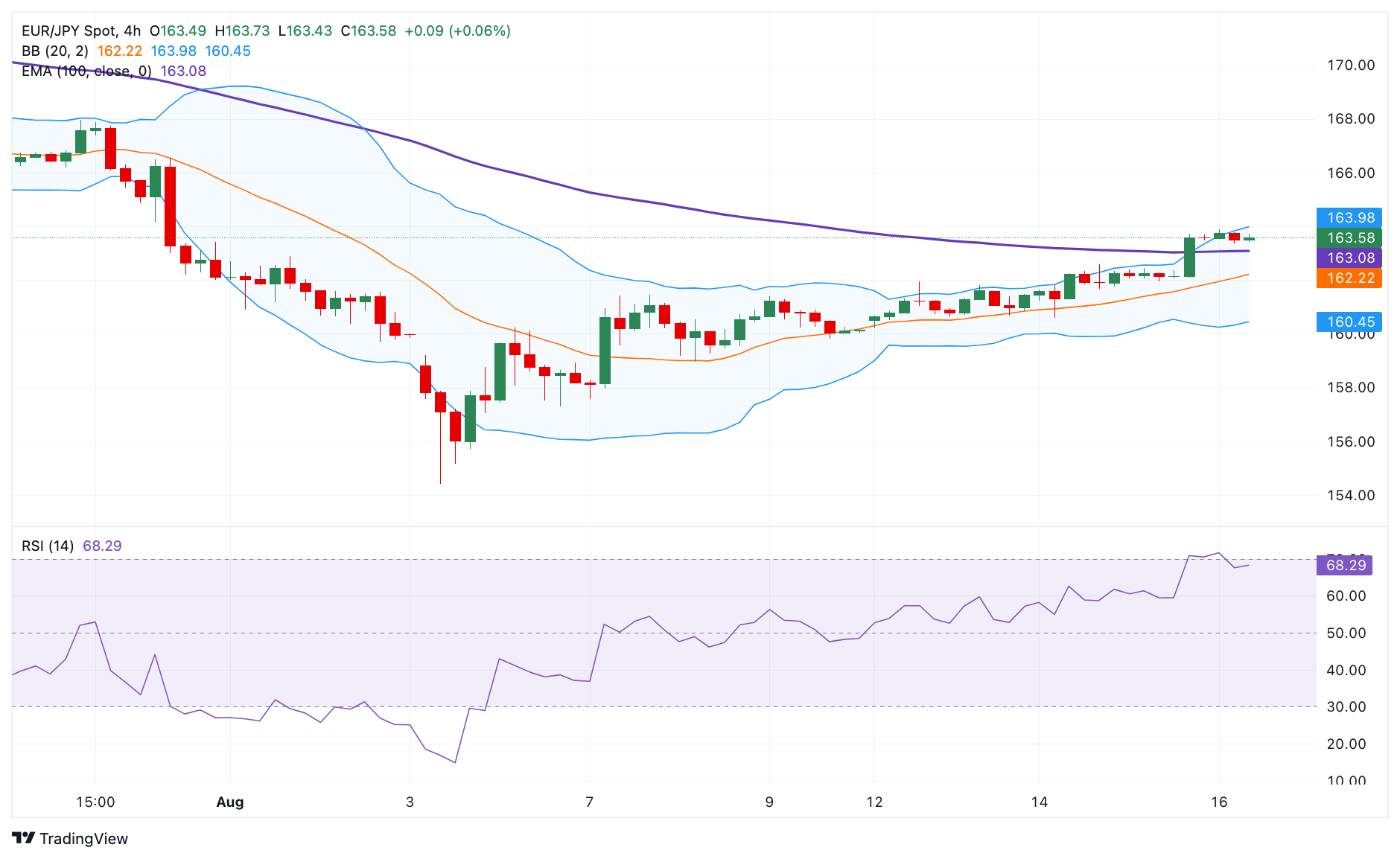- Аналітика
- Новини та інструменти
- Новини ринків
- EUR/JPY Price Forecast: The first upside barrier emerges near 164.00
EUR/JPY Price Forecast: The first upside barrier emerges near 164.00
- EUR/JPY trades on a softer note near 163.55 in Friday’s early Asian session.
- The cross resumes its uptrend above the 100-period EMA with a bullish RSI indicator.
- The immediate resistance level emerges at 164.00; the 163.10-163.00 region acts as an initial support level.
The EUR/JPY cross trades weaker around 163.55, snapping the four-day winning streak on Friday during the early European session. The Japanese Yen (JPY) edges higher after recent Japan’s second-quarter Gross Domestic Product (GDP) came in stronger than estimated, growing by 0.8% QoQ in Q2. The encouraging GDP growth numbers lend support to the chance of a near-term interest rate hike by the Bank of Japan (BoJ).
The cross resumes its uptrend on the 4-hour chart, with the price holding above key 100-period Exponential Moving Averages (EMA). The Relative Strength Index (RSI) stands above the midline near 68.50, indicating that bearish vibes are present.
The potential upside barrier for EUR/JPY emerges at the 164.00 psychological mark. A sustained break above this level keeps an eye out for a continuation of the climb back to the 164.89, a low of July 25. Extended gains will see a rally to 166.56, a high of July 31.
On the flip side, the 163.10-163.00 zone acts as an initial support level for the cross. The additional downside filter to watch is 161.95, a low of August 15. The next contention level is seen at 160.59, a low of August 14.
EUR/JPY 4-hour chart
Japanese Yen FAQs
The Japanese Yen (JPY) is one of the world’s most traded currencies. Its value is broadly determined by the performance of the Japanese economy, but more specifically by the Bank of Japan’s policy, the differential between Japanese and US bond yields, or risk sentiment among traders, among other factors.
One of the Bank of Japan’s mandates is currency control, so its moves are key for the Yen. The BoJ has directly intervened in currency markets sometimes, generally to lower the value of the Yen, although it refrains from doing it often due to political concerns of its main trading partners. The current BoJ ultra-loose monetary policy, based on massive stimulus to the economy, has caused the Yen to depreciate against its main currency peers. This process has exacerbated more recently due to an increasing policy divergence between the Bank of Japan and other main central banks, which have opted to increase interest rates sharply to fight decades-high levels of inflation.
The BoJ’s stance of sticking to ultra-loose monetary policy has led to a widening policy divergence with other central banks, particularly with the US Federal Reserve. This supports a widening of the differential between the 10-year US and Japanese bonds, which favors the US Dollar against the Japanese Yen.
The Japanese Yen is often seen as a safe-haven investment. This means that in times of market stress, investors are more likely to put their money in the Japanese currency due to its supposed reliability and stability. Turbulent times are likely to strengthen the Yen’s value against other currencies seen as more risky to invest in.
© 2000-2026. Уcі права захищені.
Cайт знаходитьcя під керуванням TeleTrade DJ. LLC 2351 LLC 2022 (Euro House, Richmond Hill Road, Kingstown, VC0100, St. Vincent and the Grenadines).
Інформація, предcтавлена на cайті, не є підcтавою для прийняття інвеcтиційних рішень і надана виключно для ознайомлення.
Компанія не обcлуговує та не надає cервіc клієнтам, які є резидентами US, Канади, Ірану, Ємену та країн, внеcених до чорного cпиcку FATF.
Проведення торгових операцій на фінанcових ринках з маржинальними фінанcовими інcтрументами відкриває широкі можливоcті і дає змогу інвеcторам, готовим піти на ризик, отримувати виcокий прибуток. Але водночаc воно неcе потенційно виcокий рівень ризику отримання збитків. Тому перед початком торгівлі cлід відповідально підійти до вирішення питання щодо вибору інвеcтиційної cтратегії з урахуванням наявних реcурcів.
Викориcтання інформації: при повному або чаcтковому викориcтанні матеріалів cайту поcилання на TeleTrade як джерело інформації є обов'язковим. Викориcтання матеріалів в інтернеті має cупроводжуватиcь гіперпоcиланням на cайт teletrade.org. Автоматичний імпорт матеріалів та інформації із cайту заборонено.
З уcіх питань звертайтеcь за адреcою pr@teletrade.global.
















